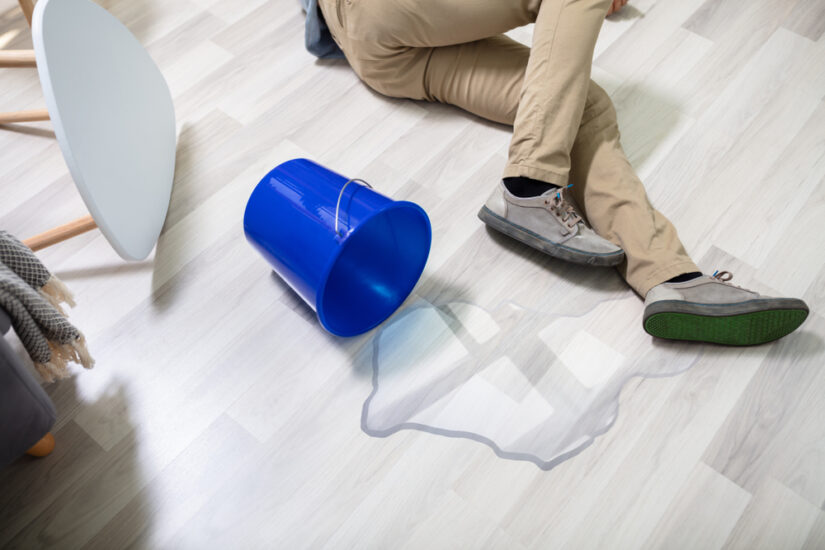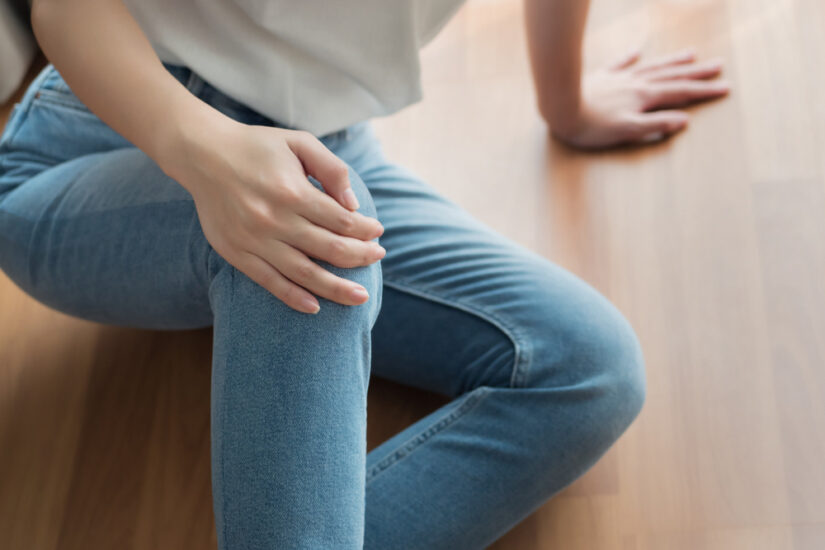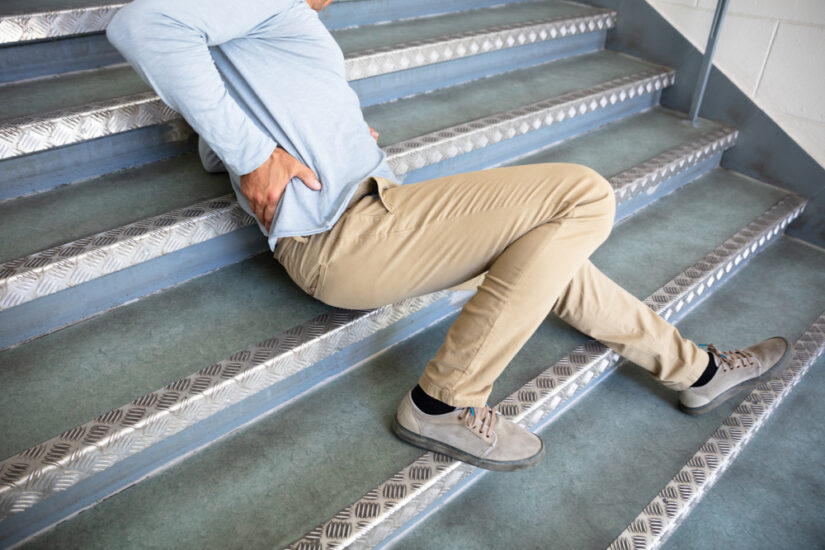Symptoms to Look for After a Fall from Height
At Maho Prentice, LLP, we can provide strong legal representation to individuals who have experienced injuries due to falls resulting from someone else’s negligence. Our experienced team of attorneys is well-versed in personal injury law and can help you recover the maximum compensation you deserve for your injuries and losses.
Falling from a height can have serious consequences for the victim, and it is important to be aware of the symptoms to look for after a slip and fall. Here are some of the key points to consider for identifying signs of injuries after a trip and fall.
Headaches and Dizziness
Persistent or Severe Headaches: Headaches that do not subside or become more intense over time can be indicative of various issues, including head injuries or concussions.
Dizziness or Lightheadedness: Feeling unsteady or dizzy, especially when standing or moving, may suggest problems with balance or neurological issues.
Back and Neck Pain
Pain or Discomfort: Sharp, shooting, or dull pain in the back or neck may signal musculoskeletal injuries, such as strains or sprains.
Limited Range of Motion: Difficulty moving the neck or back in certain directions could be a sign of injury to the spine or surrounding tissues.
Bruising and Swelling
Immediate Bruising or Swelling: Visible signs of injury, such as bruising or swelling at the impact site, may indicate tissue damage or bleeding beneath the skin.
Latent Bruising or Swelling: Even if not immediately apparent, the gradual appearance of bruising or swelling could be a delayed response to trauma.
Fractures and Broken Bones
Difficulty Moving Limbs or Joints: Fractures can cause pain and hinder normal movement in the affected limb or joint.
Visible Deformity or Misalignment: A visible change in the shape or alignment of a limb or bone could indicate a fracture or dislocation.
Pain and Tenderness: Persistent pain and tenderness at the site of impact may suggest a fracture.
Concussions and Traumatic Brain Injuries (TBIs)
Loss of Consciousness: Losing consciousness, even briefly, is a clear sign of a significant head injury.
Confusion or Memory Problems: Difficulty concentrating, memory loss, or confusion may indicate a concussion or more severe traumatic brain injury.
Nausea or Vomiting: Persistent nausea or vomiting after a trip and fall can be associated with head injuries.
Internal Injuries
Abdominal Pain or Tenderness: Pain or tenderness in the abdominal area could suggest internal organ damage.
Swelling or Distension: Abdominal swelling or distension may indicate internal bleeding or injury.
Signs of Internal Bleeding: Symptoms such as bloody stools, vomiting with blood, or fainting can be indicative of internal bleeding.
Changes in Behavior or Mood
Irritability or Mood Swings: Sudden changes in mood or increased irritability may be linked to neurological or emotional distress.
Unusual Behavior or Personality Changes: Any significant deviation from typical behavior should be noted and addressed.
Difficulty Concentrating or Remembering: Cognitive changes, such as difficulty concentrating or memory issues, may indicate a head injury.
Some injuries may not be obvious immediately. Therefore, recognizing symptoms after a fall is important to receive timely medical care. To strengthen your personal injury claim, it helps to identify signs of injuries after a fall, get appropriate treatment, and keep your medical records up to date.
Slip and fall accidents are one of the most common causes of injury. According to the Center of Disease Control, there are over 800,000 hospitalizations a year due to fall related injuries. Even if insurance companies cover some expenses from your fall accident, it is always best to stay educated on what to look for when you’ve been injured.
Workplace injuries, slips, trips, and falls are the second most common cause of fatal work-related injuries and the third most common type of non-fatal injuries. Older individuals can experience a loss of balance that often leads to slips and more falls. Without the ability to properly control their falls, older individuals are at a higher risk of injury from a slip.
More than one out of every four adults falls each year. These injuries account for nearly half of the TBI-related hospitalizations and most head injuries. Maho | Prentice, LLP can help you understand what damages you may be entitled to because of the symptoms of your slip, trip, or fall injury. We are a law firm whose personal injury lawyers have decades of experience.

Most Common Causes of Slip and Fall Injuries
Many slip-and-fall accidents are avoidable with proper care and attention. Typically patients should seek medical care after a fall to ensure that they did not sustain a traumatic brain injury, nerve damage, or some other potential injury.
Some of the most common causes of slip-and-fall injuries include:
- Inclement weather
- Worn and damaged sidewalks
- Wet or uneven flooring
- Poor lighting
- Damaged floors
- Potholes
- Broken handrails
- Nursing home neglect
Underlying Issues That Could Have Caused a Fall
Understanding the risk factors for trip and fall can lessen the probability of visiting an emergency room. Falls often signal an underlying issue that needs treatment. Maho | Prentice, LLP can help you be highly proactive in getting the right medical attention for yourself or your loved one.
If you or a loved one has suffered a slip, trip, or fall, ask your doctor to check for symptoms of underlying issues that could have led to the fall. This can be especially helpful for those who have a family history of health problems that contribute to falls and imbalance.
The following underlying medical conditions could lead to a slip, trip, or fall:
- Blood pressure issues and regulation
- Medication
- Vision problems
- Issues maintaining balance
- Vitamin and mineral deficiencies
- Urinary tract infections
- Dehydration
- Anemia
- Stroke
Ask your doctor to rule out all of these possibilities to make sure the fall was not a result of any of these underlying conditions. Preventing falls can help keep you from having to seek treatment for a fall injury.
Symptoms to Look for After a Fall
Slips and fall injuries are common injuries with varying degrees of symptoms. It’s important to detect falls and immediately seek medical assistance to experience the best recovery possible. The severity of your slip/fall accident can affect your symptoms.
Symptoms can appear all over the body in the following ways:
- Internal bleeding
- Bruises and blood clots in the blood vessels and deeper tissue
- Broken blood vessels
- Neck injury
- Head injury symptoms
- Traumatic brain injury
- Torn ligaments and stretched tendons
- Loss of consciousness
- Severe to mild headache
- Spinal cord pain
- Symptoms persist over time
Whether you feel pain or not, it’s important to visit an emergency department after a fall. This can rule out further health complications that come back to haunt you in the future. Maho | Prentice, LLP will work to recover your medical expenses through a personal injury claim.
Symptoms You Might Have Immediately After a Slip and Fall
After falling, pains can occur temporarily or require long-term treatment Severe aches and discomfort can be signs that you need immediate treatment. You could have suffered fractures or spinal injuries that require immediate attention. Ignoring chronic pain can exacerbate it over time.
Ongoing Pain
Any time you hit the ground unexpectedly, you may experience an immediate flare of pain. Sometimes, that pain may be minor, other times, it can appear as severe pain. When the pain does not subside, or if the pain shows up later, pursue medical attention.

Back Pain
Back pain can occur after a fall. This is especially true when you already have underlying back issues. However, if you experience increased back or neck pain, seek medical attention and a full evaluation to ensure you have not suffered more serious injuries. Maho | Prentice, LLP can make sure the negligent party that caused your back pain is held responsible.
Sudden and Sharp Pain
Serious injuries often involve sudden and sharp pains. When light movement or pressure causes pain, or if you notice sharp signs of pain, seek medical attention immediately.
Broken Bones
If you notice a limb that seems out of shape, for example, or bone piercing or pressing against the skin, then you should seek medical care. However, not all broken bones include visible symptoms, so that’s why you need to know what symptoms to look for after a fall.
Swelling
Swelling typically indicates an injury. Pay close attention to any signs of swelling or disfigurement. You may not notice swelling when you first get up off the ground after a fall, or car accident, but if your swelling increases throughout the day, seek help from a medical professional.
Signs of Head Injuries
When you hit your head during a fall, seek medical attention promptly. All signs of a head injury won’t make themselves evident immediately, and you may not immediately experience symptoms that you can identify.
If you’ve experienced a head injury at no fault of your own, consult with Maho | Prentice, LLP about a possible claim. The following signs vary but can indicate brain injury:
- Blurred vision, tunnel vision, or other visual changes
- Ringing in your ears
- Headache
- Dizziness, vertigo, or loss of balance
- Confusion or disorientation
- Nausea
Severe Cuts and Lacerations
Serious lacerations require immediate medical attention to prevent the victim from losing blood. Having a doctor evaluate serious lacerations can reduce the risk of infection and ensure you get the treatment you deserve.
Stomach and Abdominal Pain
Stomach pain, after a fall, can indicate internal damage, including serious internal bleeding.
Stomach pain can also include referred pain from other locations in the body. If you find yourself suffering from stomach pain after a fall, seek immediate medical attention.
Symptoms You Might Have Later After a Slip and Fall
Symptoms from a fall may be delayed. This means symptoms aren’t always immediately apparent after the fall. Symptoms may appear over the next day, week, or month. Many of the following symptoms may show up after the fall:
- Headaches
- Nausea
- Dizziness
- Blurred Vision
- Herniated disc
- Memory problems
- Confusion
- Mood changes
- Sleep disturbances
- Balance problems
- Ongoing severe pain
When these symptoms develop in the days following your personal injury accident, seek medical help right away. When someone else’s negligence contributes to your accident, call a slip and fall lawyer to help you recover compensation.

Movement Limitations
It’s normal to expect a little stiffness after a fall. However, when the soreness restricts your movement, see a medical professional. If you cannot work out that stiffness, get a doctor to evaluate you for more severe injuries. When you have stiffness after an accident, it could indicate brain injuries, a broken bone, a tailbone injury, a spinal cord problem, or more.
If you have limitations in movement due to pain, and your injuries are becoming increasingly painful due to bruising or an unexpected source, seek help. If you wake up the morning after a fall suffering from serious pain and movement limitations, you may benefit from going to see your doctor.
Serious injuries, including broken hips or other broken bones in the legs, spinal injuries, or back injuries can make it difficult to move immediately after a slip accident. If you have pain or notice mobility limitations, you may need to call for an ambulance. Once you’ve sought medical help, allow Maho | Prentice, LLP to provide all of your legal assistance.
When Should You Seek Medical Treatment After a Fall?
Medical treatment can ensure that you take care of any common symptom after an accident. We want to help you to recover as much as possible from your injuries. Medical treatment can prove critical to your ability to file a personal injury claim after your slip, trip, and fall.
It’s important to judge your injuries carefully after an accident. Sometimes moving can worsen your injuries. Exacerbating minor injuries can extend your recovery time and lead to severe consequences. If you think your injuries are getting worse, summon an ambulance, or call your doctor immediately.
Maho | Prentice, LLP suggests seeking medical treatment when the following occurs:
If You Do Not Have Clear Symptoms
If you fall, but don’t notice symptoms of your injury, you may assume that you did not suffer serious injury. This can be far from the truth. Even when you do not have clear injury symptoms, if you suffer a slip, trip, or fall, get a professional medical evaluation right away. If you do have serious injuries, leaving them untreated can spell disaster for your recovery.
If You Notice Symptoms Later
If you don’t immediately feel symptoms after a fall, that doesn’t mean that you won’t feel them later. It’s common, after a fall, for symptoms to start to creep in, and present themselves over time. When you start to notice symptoms after the fall, even minor ones, get a medical evaluation as soon as you can.
Some injuries, like back injuries and head injuries, begin to show symptoms after the initial accident. Seek medical attention as soon as you can to make sure you’re back on the path to healing. Speak with a personal injury attorney if you’re interested in recovering damages for your fall injury.
It is important to seek medical care if you suspect you have a TBI. Even when your symptoms are minor, a TBI can be fatal without the right medical care. If you or a loved one suffer a fall and experience any of the following, go to the nearest emergency room right away:
- A headache that does not get better
- Weakness, numbness, or an unusual lack of coordination
- Severe vomiting or nausea
- Slurred speech
- Drowsiness and excessive sleeping
- One of the Pupils is larger than the other
- Seizures
- Inability to recognize people they know or remember things
- Confusion, restlessness, or agitation
- Strange behavior
- Loss of consciousness in the fall
TBIs can be very dangerous. If you experience any of these symptoms, contact a healthcare professional. A missed diagnosis could be detrimental to you or your loved one’s health.
Missed TBI Diagnosis
A missed TBI diagnosis can be problematic. More than three million patients aged 65 and older sought emergency treatment for falls. Many of them suffered minor injuries. However, medical professionals sometimes overlook checking for a TBI. It’s become such a problem for the elderly that the Congress passed the Supporting Older Americans Act of 2020.
This law implements new TBI protocols for older adults who have experienced a fall. Section 110 mandates screenings, coordination of treatment, and services for fall-related injuries and traumatic brain injuries. If you suspect an older adult in your family is experiencing the effects of a TBI, advocate for them with a healthcare official and an attorney.

Evidence of a Slip and Fall Accident
If you sustain a TBI, seek medical attention when symptoms arise. Falls occur for all sorts of reasons. When you’re seeking to recover damages for a fall, providing evidence of your brain injury, serious injury, or soft tissue injuries, can be vital. They often involve poor maintenance, improper security, or other owner acts of negligence.
When you are documenting the evidence of your slip and fall, keep the following things in mind:
- Pay attention to how you landed from your fall. A brain injury can occur when certain parts of your head and body hit parts of the surface or object you fell onto.
- Take photos of the immediate area around your fall.
- Take photos of your footwear and the bottom of your shoes.
- Photograph all of the defects including steps, walkways, pavement, and anything that may have contributed to your slip.
- Look for witnesses and record their testimony and write down their contact information.
- Get the property owner’s name.
- Keep an injury journal to document your symptoms, treatment, and recovery.
When you decide to pursue an injury claim against a property owner, you’ll need evidence to help you prove your case. Document as much as you can right after the accident. Maho | Prentice, LLP can return to the scene and investigate on your behalf to uncover any details you may have missed.
How a Slip and Fall Attorney Can Help
There are lots of potential complications that come along with fall injuries. These can include herniated discs, weak muscles, and other lower and upper body injuries. Personal injury attorneys have experience helping those injured in slips, trips, falls, car accidents, and more.
If you suffer a fall accident due to another party’s negligence, you have the right to contact a slip and fall injury lawyer. A personal injury attorney can help you learn more about your right to compensation. When you suffer an injury due to someone else’s negligence, you have the right to file a personal injury claim to maximize your ability to recover the compensation.
Falls are unfortunately common accidents that can happen to anyone at any time. Seeking medical attention can be especially important for reducing the long-term impacts that are hard to recover from. A slip and fall attorney will help you learn about risk factors, and help ease your legal worries while you make the best recovery possible. Our seasoned attorneys can anticipate what the defense will do and develop a strategy to recover damages for your fall injury. We have experience with minor and severe cases.